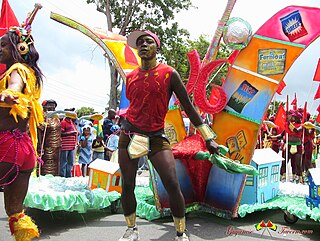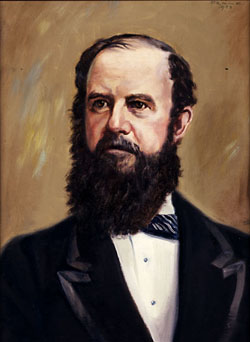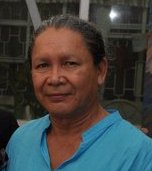Guyanese culture reflects the influence of African, Indian, Amerindian, British, Portuguese, Chinese, Creole, and Dutch cultures. Guyana is part of the mainland Caribbean region. Guyanese culture shares a continuum with the cultures of islands in the West Indies.

Mashramani, often abbreviated to "Mash", is an annual festival that celebrates Guyana becoming a Republic in 1970.
Guyanese literature covers works including novels, poetry, plays and others written by people born or strongly-affiliated with Guyana. Formerly British Guiana, British language and style has an enduring impact on the writings from Guyana, which are done in English language and utilizing Guyanese Creole. Emigration has contributed to a large body of work relating the Guyanese diaspora experience.
Fred D'Aguiar is a British-Guyanese poet, novelist, and playwright of Portuguese descent. He is currently Professor of English at the University of California, Los Angeles (UCLA).
Roy Aubrey Kelvin Heath was a Guyanese writer who settled in the UK, where he lived for five decades, working as a schoolteacher as well as writing. His 1978 novel The Murderer won the Guardian Fiction Prize. He went on to become more noted for his "Georgetown Trilogy" of novels, consisting of From the Heat of the Day (1979), One Generation (1980), and Genetha (1981), which were also published in an omnibus volume as The Armstrong Trilogy, 1994. Heath said that his writing was "intended to be a dramatic chronicle of twentieth-century Guyana".
Ian McDonald is a Caribbean-born poet and writer who describes himself as "Antiguan by ancestry, Trinidadian by birth, Guyanese by adoption, and West Indian by conviction." His ancestry on his father's side is Antiguan and Kittitian, and Trinidadian on his mother’s side. His only novel, The Humming-Bird Tree, first published in 1969, is considered a classic of Caribbean literature.
Jan Rynveld Carew was a Guyana-born novelist, playwright, poet and educator, who lived at various times in The Netherlands, Mexico, the UK, France, Spain, Ghana, Jamaica, Canada and the United States.
Latchmie Kumarie Vainmati Kallicharran was a Guyanese writer. She was one of the pioneers of Indo-Guyanese cultural awareness.
Marc Matthews is a Guyanese writer, actor, broadcaster and producer.
Wordsworth McAndrew was a leading Guyana folklorist, poet, radio broadcaster, and creative artist.
Aubrey Williams was a Guyanese artist. He was best known for his large, oil-on-canvas paintings, which combine elements of abstract expressionism with forms, images and symbols inspired by the pre-Columbian art of indigenous peoples of the Americas.

The Musgrave Medal is an annual award by the Institute of Jamaica in recognition of achievement in art, science, and literature. Originally conceived in 1889 and named in memory of Sir Anthony Musgrave, the founder of the Institute and the former Governor of Jamaica who had died the previous year, the medal was the first to be awarded in the Western Hemisphere.

George Simon was a Guyanese Lokono Arawak artist and archaeologist. He was the founder and mentor of the Lokono Artists Group, a group of Lokono artists from Guyana, based primarily in his hometown of St. Cuthbert's Mission. Simon was widely regarded as one of the leading Guyanese artists of his generation, and his paintings are notable for their explorations of Amerindian culture and the Guyanese environment. He was also recognized for his achievements as an educator, his efforts to develop opportunities for Amerindian artists in Guyana, and for his work as an archaeologist.
Rajkumari Singh was an Indo-Caribbean, Guyanese writer, political activist, educator, and cultural leader. She is the author of the essay "I am a Coolie". Singh was the first published Indian woman from the Caribbean and although she never used the term "feminist," her life's work contributed to feminist literature of the Caribbean, in addition to her advancement of a national Guyanese culture of integration while still upholding Indian culture within this new construct.
Keith Waithe is a Guyana-born musician, composer and teacher who has been based in the United Kingdom since 1977. He is best known as a flautist and founder of the Macusi Players – a world music jazz band whose name derives from the indigenous Guyanese Macushi people – and has been "acknowledged as the best flute player that Guyana has ever produced". His musical style explores a fusion of jazz, classical, African, Caribbean, Asian and Western influences, and he has also developed a technique he calls "vocal gymnastics", in which he uses the voice to reproduce percussive sounds. Music critic Kevin Le Gendre notes that Waithe "has single-mindedly pursued his own artistic agenda, developing a songbook that draws heavily on African-Caribbean and Asian folk traditions as well as jazz ingenuity in a manner not dissimilar to a large number of his forebears, of which Yusef Lateef is perhaps the most direct reference."

Bertram Israel Augustus Charles was an influential Caribbean playwright who, with the theatre company he founded, Related Arts Group, wrote and produced plays in Georgetown, Guyana. Between 1963 and 1971 he produced sixteen one act and full-length plays at The Theatre Guild of Guyana Playhouse, including The End of the Affair (1968), The Alexin of Our Cure (1969) and Within Our Narrow Walls (1971). Today, in print, there are five Bertram Charles plays in 10 publications held by 42 libraries around the world, including The Library of Congress, Washington, D.C., The British Library and the University of Toronto.
William George Moore was a musician and composer from Georgetown, Guyana. Moore had been one of the lead vocalists in the male group The Four Lords. He died in destitution in 2002 at the Georgetown Public Hospital. It is said of him that he was an icon.

Valerie Muriel Rodway was a Guyanese composer of cultural and patriotic songs, inspired by the events leading up to Guyana's independence in 1966. She is best known for composing music to accompany Guyana national poetry, like Arise, Guyana, Kanaïma, and the Martin Carter's Guyanese Independence poem Let Freedom Awaken. For the next two decades, school children were taught the songs she and others composed to inspire patriotism and cultural affinity. She selected the poetry for her compositions based upon her principles and values, first developed among her parents and siblings.




